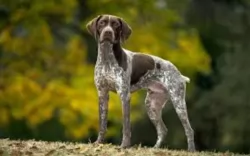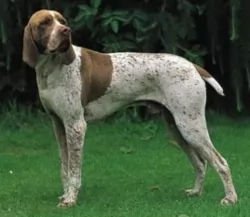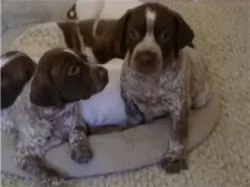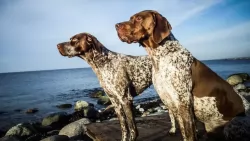 MyDogBreeds
MyDogBreeds Carolina Dog is originated from United States but Braque Francais (Gascogne Type) is originated from France. Carolina Dog may grow 8 cm / 3 inches shorter than Braque Francais (Gascogne Type). Carolina Dog may weigh 12 kg / 26 pounds lesser than Braque Francais (Gascogne Type). Both Carolina Dog and Braque Francais (Gascogne Type) has same life span. Carolina Dog may have less litter size than Braque Francais (Gascogne Type). Carolina Dog requires Moderate maintenance. But Braque Francais (Gascogne Type) requires Low maintenance
Carolina Dog is originated from United States but Braque Francais (Gascogne Type) is originated from France. Carolina Dog may grow 8 cm / 3 inches shorter than Braque Francais (Gascogne Type). Carolina Dog may weigh 12 kg / 26 pounds lesser than Braque Francais (Gascogne Type). Both Carolina Dog and Braque Francais (Gascogne Type) has same life span. Carolina Dog may have less litter size than Braque Francais (Gascogne Type). Carolina Dog requires Moderate maintenance. But Braque Francais (Gascogne Type) requires Low maintenance
 The Carolina dog comes from wild dogs that used to run with the Paleo-Indians of North America, and today they can still be found in their wild state near the Georgia-South Carolina border.
The Carolina dog comes from wild dogs that used to run with the Paleo-Indians of North America, and today they can still be found in their wild state near the Georgia-South Carolina border.
Many scientists believe that the dog was first domesticated from the wolf thousands and thousands of years ago. Today there aren’t many records on the Carolina Dog’s history and it isn’t sure how long they lived their feral lifestyle in the American South, but it seems as though it was for hundreds of years.
You could say that the modern history of the Carolina Dog started in the 1980s. Dr. Pam Brisbin found a puppy at a dump site which looked like the Australian Dingo. Dr Brisbin and other scientists concluded that the Carolina Dog was a remnant of primitive dogs. Since those times the Carolina Dog has adapted well to being a domesticated pet.
 The Braques Français – Gascogne – is a hunting dog from southern France’s Gascony region. Known also as the French Gascony Pointer, this dog has descended from Spanish and Italian Pointers. The dog was saved from extinction at the turn of the 20th century.
The Braques Français – Gascogne – is a hunting dog from southern France’s Gascony region. Known also as the French Gascony Pointer, this dog has descended from Spanish and Italian Pointers. The dog was saved from extinction at the turn of the 20th century.
There are actually two breeds of Braque français, with the other being somewhat smaller and known as Braque français, type Pyrénées. Whichever one you have, they are popular hunting dogs in France. The first breed club was established in 1850.
 The Carolina dog is part of the Sighthounds Group and looks a bit like a Dingo, German Shepherd and Wolf mix. He has fairly long, pointed erect ears, a sharp wolf-like snout and a long tail that curves when raised.
The Carolina dog is part of the Sighthounds Group and looks a bit like a Dingo, German Shepherd and Wolf mix. He has fairly long, pointed erect ears, a sharp wolf-like snout and a long tail that curves when raised.
The Carolina dog has been re-discovered however and when trained and socialized, they make splendid pets. It’s a medium sized dog standing at 45–61cm and weighing from 15–20kg. He is slender, muscular and athletic with a coat that is short and fairly smooth. Colors for the Carolina dog vary and he can be fawn colored, a gingerish color, black and tan and can have some white areas on the paws, chest, muzzle and tail.
The Carolina Dog has been a wild dog, belonging to a pack and while he isn’t aggressive, he is nervous and aloof around strangers. Good training and socialization provides him with the skills to get along well with his human family as well as with children and other pets in the home.
Because this dog has always been wild, they tend to maintain some of their wild, independent nature and they can be difficult to train and it requires firmness and patience with him, but he is an intelligent breed.
 The Braque Francais is a dog which looks much like the German Short-haired Pointer. The Braque Francais (Gascogne) is a large breed dog, standing roughly 56 – 69cm. Weight is most times dependent on height, but the average weighs between 35 and 55 pounds. The dog is attractively lean and muscular and the tails have always been docked, although rules and regulations see the breed with a long tail these days. The natural tail of the Braque Francais is medium length. The eyes of this breed are brown or yellow and the ears are medium in length and floppy. The coat of the Gascogne is short and dense and in two colors – white and chestnut patching and mottling.
The Braque Francais is a dog which looks much like the German Short-haired Pointer. The Braque Francais (Gascogne) is a large breed dog, standing roughly 56 – 69cm. Weight is most times dependent on height, but the average weighs between 35 and 55 pounds. The dog is attractively lean and muscular and the tails have always been docked, although rules and regulations see the breed with a long tail these days. The natural tail of the Braque Francais is medium length. The eyes of this breed are brown or yellow and the ears are medium in length and floppy. The coat of the Gascogne is short and dense and in two colors – white and chestnut patching and mottling.
The dog is a keen tracker and is an excellent game and gun dog with some of them requiring more training than others. Training and socialization makes the Braque Francais an excellent, obedient pet who is eager to please and he is considered to be easily trainable, learning quickly. He loves his human family and is noted for his gentle, friendly nature, and he therefore makes and excellent family pet where there are children and other pets.
 The Carolina Dog is a medium-sized dog which has managed to survive well in the wild environment. It is this life in the wilds which has made the dog to be shy and aloof around strangers.
The Carolina Dog is a medium-sized dog which has managed to survive well in the wild environment. It is this life in the wilds which has made the dog to be shy and aloof around strangers.
They are skilled and intelligent and when domesticated they make extraordinary pets even though he isn’t an overly affectionate dog. It is why he requires early socialization so that he doesn’t grow up shunning humans.
With training however, the Carolina Dog becomes a well-adjusted, loving and social member of the family.
 The attractive Braque Francais is a calm, contented dog who is also affectionate, social and intelligent. He is already a well mannered dog but will do even better with training and socialization. However, Braque Francais don’t take well to aggressive training and done the wrong way, the dog can end up being timid and confused.
The attractive Braque Francais is a calm, contented dog who is also affectionate, social and intelligent. He is already a well mannered dog but will do even better with training and socialization. However, Braque Francais don’t take well to aggressive training and done the wrong way, the dog can end up being timid and confused.
Wanting to please and being an intelligent dog, training should be fun, lighthearted but firm. In exchange you’re going to have an awesome friend from this wonderful, loving dog breed.
 The Carolina Dog is a fairly healthy breed. You won’t have to be rushing off to the vet often with him if you look after him well in terms of a good diet, a food amount of exercise and plenty of love and attention. In fact breeders of the Carolina Dog have noted that they haven’t seen any cases of genetically inheritable diseases with this robust dog.
The Carolina Dog is a fairly healthy breed. You won’t have to be rushing off to the vet often with him if you look after him well in terms of a good diet, a food amount of exercise and plenty of love and attention. In fact breeders of the Carolina Dog have noted that they haven’t seen any cases of genetically inheritable diseases with this robust dog.
However with all dogs, no matter how healthy they are, there can be problems. Problems common to domestic dogs can include skeletal and visual problems. Many dog owners have their pets tested to identify some of the potential health defects that some dogs are prone to. This can include hip dysplasia, cataracts, cancer and PRA or Progressive Retinal Atrophy.
 You won’t find many health issues with this active breed but nonetheless hip and joint issues will need to be watched. If you are considering a Braque Français puppy, you’ll want to be selective in choosing a responsible breeder. A healthy puppy with the right environment, can get to up to 15 years of age.
You won’t find many health issues with this active breed but nonetheless hip and joint issues will need to be watched. If you are considering a Braque Français puppy, you’ll want to be selective in choosing a responsible breeder. A healthy puppy with the right environment, can get to up to 15 years of age.
Ectropion and entropion in dogs affect their eyelids. Ectropion is where the eyelids roll outward, whereas entropion is where the eyelids curve inward, irritating the eye. Because visual and skeletal problems occur in this breed, it can be recommended that owners have their pets tested by both the Canine Eye Registration Foundation as well as the Orthopedic Foundation for Animals.
 The Carolina Dog is a seasonal shedder and the shortish coat will simply require a thorough brushing twice a week to keep him in tip top condition.
The Carolina Dog is a seasonal shedder and the shortish coat will simply require a thorough brushing twice a week to keep him in tip top condition.
This dog, with his upright ears, isn’t prone to ear infections as other breeds, but nonetheless as part of his grooming routine, its a good idea to to check his ears inside for wax build-up and dirt. Certainly his teeth should be brushed 2 or 3 times a week with special dog toothbrush and toothpaste. This keeps the gums and teeth healthy and also avoids other diseases that come about because of dental disease.
Whether you feed your Carolina Dog once or twice a day, you want to ensure the very best quality diet to avoid skin problems and illness. You also have to ensure your dog has 24/7 access to fresh, cool drinking water to help him with digesting his food.
There are some excellent commercially manufactured dog foods on the market which have been manufactured for certain stages of your dogs life. Add in some rice, vegetables and meat from time to time and every now and again you can give him some raw meat too.
 Brushing the coat twice a week will get rid of loose hairs and maintain the sheen of the coat. Also, as a floppy eared breed, attention should be given to the ears to prevent infections. He will also need to have his teeth brushed with dog toothpaste and brush to prevent the build-up of damaging plaque and his nails will also require a clipping if they don’t manage to wear down naturally.
Brushing the coat twice a week will get rid of loose hairs and maintain the sheen of the coat. Also, as a floppy eared breed, attention should be given to the ears to prevent infections. He will also need to have his teeth brushed with dog toothpaste and brush to prevent the build-up of damaging plaque and his nails will also require a clipping if they don’t manage to wear down naturally.
Daily activity will be needed for this dog and he will want a walk every day. He certainly isn’t a dog you can leave indoors or outside in your backyard day after day. Any activities that require physical exertion will be good because they are exceptional athletes. If you are a cyclist or a runner, take him with you – he’ll love it.
Your Braque Francais loves energetic activities and for this he will require an excellent nutrient-rich diet. Nutrient-rich dog foods are higher in protein and fat and lower in carbohydrates. It’s important to check out the carbohydrate content in commercial dog foods to avoid those one high in carbohydrates.
Your vet can always advise you on a good quality food and you can always give him your own home-prepared foods which include rice, vegetables and meat. Certainly include some raw meat into his diet every now and then to avoid skin problems. Fresh, cool water must be available to him night and day.